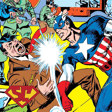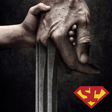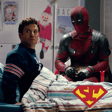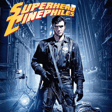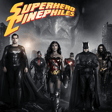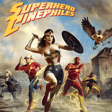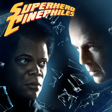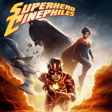Become a Creator today!Start creating today - Share your story with the world!
Start for free
00:00:00
00:00:01

The Phantom
Before the superhero cinema boom, there was a smaller trend in the 90s of translating pulp characters into film and TV. This week, Perry is joined by pulp author John Bruening to discuss The Phantom, a kind of bridge character between the pulps and superheroes. The movie's not as bad as you may have heard, but it's not without its flaws.
---
Send in a voice message: https://anchor.fm/superherocinephiles/message
Recommended
Transcript
Introduction to Audible's Offerings
00:00:00
Speaker
Hey, fellow superhero cenophiles. Did you know that almost 30% of adults say they haven't read a book in the past year? Primary reason why is a lack of time. Well, Audible's here to help with the gift of found time. Thanks to Audible, you can listen to audiobooks like Marvel Comics, The Untold Story, or Slugfest inside the epic 50-year battle between Marvel and DC.
00:00:19
Speaker
Read up on the history of superheroes in comics and movies with Grant Morrison's Supergods. You can also check out Vanguard, my original superhero novel series, or try The Vrilagenda or The Adventures of Fortune McCall, both of which were written by our duly departed host emeritus, Derek Ferguson.
00:00:35
Speaker
Whatever you're looking for, Audible has thousands of titles that you can consume while commuting, exercising, cooking, or just relaxing at home. And not only audiobooks, an Audible membership also gives you access to tons of content like podcasts, theatrical performances, and exclusive Audible originals that you won't find anywhere else. To give you a taste of what you can get, Audible is partnered with this show to provide listeners with a free 30-day trial.
00:00:59
Speaker
All you have to do is go to audibletrial.com slash SuperCinemapod and with your free trial you get one free audiobook and two free Audible Originals. In fact, you get to keep those titles even if you cancel before the trial is over. So what are you waiting for? Head on over to audibletrial.com slash SuperCinemapod and start your free trial today.
The Phantom's Origin
00:01:32
Speaker
It all began 400 years ago when a small boy saw his father savagely murdered by Pirates of the Seng Brotherhood. That same boy swore an oath of vengeance to fight piracy, greed, and cruelty in all its forms. And he became the First Phantom. I'm his descendant, Diana. Sworn to carry out his oath. The mantle of the Phantom was passed on from father to son.
00:02:01
Speaker
Twenty fandoms came before me. No one knew that. They all thought he was the same fandom. They all thought he was immortal. That's why they called him the Ghost Who Walks. No, I'm not immortal, Diana. I was born right here in this cave and educated in America. When my father was killed, I came back to take his place.
00:02:34
Speaker
And one day your own son will take your place. Yes.
Pulp Heroes and Guest Introduction
00:02:41
Speaker
Welcome to the Superhero Cinephiles podcast. I'm your host, Perry Constantine. And so.
00:02:48
Speaker
For fans of superheroes, fans of comic books, they probably most know, some may not, that there was a kind of a predecessor to Superman and Batman and all that, and those were the pulp heroes. These were guys like Doc Savage and The Shadow, and
00:03:07
Speaker
And they were mostly in in pulp magazines in prose format, and then they eventually served as a stepping stone to the superheroes in fact many elements of Doc Savage can be found in Superman many elements of the shadow can be found in Batman and so on.
00:03:24
Speaker
And that's what we're talking about today. We're talking about one of these heroes that have been translated into live action movies. And we're doing that with today's guest, who is a pulp author himself, and that's John Brunning. John, how are you doing today? I'm good. How are you? I'm doing pretty good. Great. So welcome to the show. Before we get started talking about today's movie, why don't you tell the people a little bit about yourself?
John Brunning's Career and Inspirations
00:03:50
Speaker
Sure. As you said, the name is John Burning. I am many things, actually. I am the author of the multi-part Midnight Guardian series, which is published by Flinch Books, which is a small press imprint that was launched about six years ago, 2015, by Jim Beard, also a writer editor in the Ohio area, in the Toledo area.
00:04:14
Speaker
and myself. And we publish our own stuff, our own novels, our own characters, as well as we also develop anthologies where we invite numerous writers to gather around a specific topic or genre and just have at it and do what they do best. So that is sort of the short version. I've been a
00:04:37
Speaker
professional writer for about 35 36 years started out as a journalist in the mid 1980s. I transitioned into marketing in the early 2000s. So I've been
00:04:48
Speaker
I've been a scribe of one kind or another for more than three decades. So I've been doing this for a while. Yes. Almost my entire life, actually. Don't say that. Anyway, so let's talk a little bit about the the pulp heroes and let's talk about superheroes in general. Were you a fan of superheroes growing up? Yeah, I think
00:05:12
Speaker
I learned to read somewhere around the age of five and about 20 minutes later, I was reading comic books. So and I think the gateway drug for me was actually Saturday morning cartoons. But once the reading started, I did about maybe 20 minutes of Dick and Jane and then I went right to Superman. And I probably spent the first 20 to 25 years of my life immersed in comics. It got to be kind of expensive hobby by the time I was coming out of college. So I just sort of
00:05:40
Speaker
transitioned out of that and got more into prose reading but I've been reading everything for like the the vast majority of my life but yeah there were a lot of certainly a lot of comics in the first 20 to 25 years so you say that I was pretty well immersed yeah so you say that uh Saturday morning cartoons is your gateway drug any any any show in particular that was the one that kind of got you hooked
00:06:01
Speaker
I would have to say, now you got to remember I'm from Cleveland, Ohio. So it was probably what was then called the New Adventures of Superman. It was produced by Filmation Studios, which was probably their first big name title to come out of that shop. I think that series started somewhere around 66 or 67. It was voiced by Bud Collier, who had done the voice of Superman in the 1940s on the radio.
00:06:30
Speaker
as well as the Fleischer comic, the Fleischer animated shorts during the 1940s. The guy had an amazing voice. And when you're five years old and you hear that deep resonant voice coming out of your TV, you're just hooked. And like I said, I come from Cleveland, so that's the birthplace of Superman. So if you're from here, Superman is kind of in your DNA, whether you're a fan or not.
00:06:58
Speaker
Cool.
Pulp Hero Revival in the 90s
00:06:59
Speaker
Yeah. It's funny. A lot of us, I think, seem to get into comics through that route. For me, it was, you know, it was in the nineties. It was Batman, The Emitted series and X-Men that got me into it. And, you know, now people are getting in through the movies and all sorts of stuff like that. So it's always cool to see how to learn how people have kind of found their way into this little niche of ours. Now, what about the Pope stuff? Because you're a fan of the Pope stuff as well, correct?
00:07:28
Speaker
Yeah, that that came along later. And it's hard to know where exactly where and when that happened. It was sort of a confluence of events or a confluence of circumstances. Certainly my dad, he was a big fan of the pulps back in the back in the original pulp era of the 30s and 40s. He read Doc Savage, he read The Shadow.
00:07:51
Speaker
He read a lot of comics in the early days. I think he was reading Captain America. He was spending a lot of time at the local movie house on Saturdays watching westerns, watching cliffhanger serials. So, you know, which is all kind of the same vibe.
00:08:05
Speaker
that makes up the, you know, the pulps. So I guess I would have to say I started dialing into the pulps probably later than a lot of folks do. I think I started reading Edgar Rice Burroughs Mars stories somewhere around the, I want to say the 1990s. So I'm like at that point, at that point, I'm in my late 20s or thereabouts and I'm really starting to dial into Edgar Rice Burroughs in particular and the pulps in general.
00:08:32
Speaker
Okay, and were any of those that particularly stood out for you that were kind of like your go tos?
00:08:39
Speaker
Well, like I said, it started with the Burroughs, the Mars series. And then I started, you know, I started wondering, who the heck is this Doc Savage guy? And I was starting to dig around some local bookstores and not having much luck because, you know, people who collect the Bantam Paperbacks, they don't let go of those. But right. And then along I worked on a street with a really great little bookshop.
00:09:03
Speaker
And, and the woman, the proprietor there and she's still a proprietor there like 30 years later, she said,
00:09:10
Speaker
She said, she called me at my office one day and she said, you were looking for Doc Savage, right? And I said, yeah. And she said, some guy just brought in about 60 Bantam paperbacks. Do you want to hold them aside? I said, hell yes. And I was there the next day. And because I was such a frequent customer, she gave me a really sweet deal. And I bought, I brought these things home for like 30 or 40 bucks. And there were like 60, 60 different titles. And still here in my office, I'm
00:09:36
Speaker
And, you know, I have yet to make my it's been it's been more than 20 years since I bought those from her. I get to make my way all the way through all of them. But but they were they were sort of the beginning of a lot of pulp collecting of a lot of different titles, a lot of different characters, a lot of different genres.
00:09:54
Speaker
Yeah, I've found that since, because I didn't really know much about the pulps except for little things here and there, like stuff that was in movies or TV, but I didn't really read any of the original stuff until probably about the same time, probably about like my mid late twenties. And I reading some of those stuff, it's, they can be a,
00:10:17
Speaker
They can be a tough read in a modern context. But the characters are really fascinating, I've always found. Even when the reading is sometimes tough going, the characters as concepts, I think, are fascinating. Yeah, absolutely. Even if the prose is clunky sometimes,
00:10:40
Speaker
just the concept of this character and what this character is all about and how they came to be and why they do what they do, that's always kind of a fascinating concept. Yeah and the popes have had a really interesting track record because there have been these different periods of revival for different pulp characters so you know that most of them started out in the 30s during the Great Depression and then
00:11:02
Speaker
When they started, I think it was the 70s was probably like the next big boom of them when you had all these these paperback publishers putting out these collections. They were actually yeah, actually the Bantam paperback started coming out in the 60s. I couldn't I think it was 66 when they first started reprinting the Doc Savage.
00:11:20
Speaker
pulps from 30 years prior. But I think I think that whole series started around 66. And it went as far as I think I want to say about 81 or 82. Yeah. So yeah, it was actually a little even a little little earlier than what you're saying. But yeah, you're, you're in the right ballpark. And also like in the I think it was maybe the 70s or the 80s, they had started a bunch of comic publishers had also started putting out stuff like there was yes, Denny O'Neill's the shadow series is probably the most famous of those. Yes.
00:11:49
Speaker
um but then also there was like there were doc savage comics i remember yes scene two and um the avenger as well i think and yes and then in the 90s there was this really interesting period where so this was you know superhero movies hadn't really quite hit it big yet i mean you would have those standouts like superman the movie and and batman sure superhero movies in general they hadn't really quite
00:12:14
Speaker
You know, hit the kind of zeitgeist that they would later, either in the early 2000s or later with the revival with Iron Man and The Dark Knight. But in the 90s you had this interesting thing where there was a lot of pulp stuff that was being optioned and being made into movies.
00:12:31
Speaker
the obviously you know indiana jones was clearly inspired by the pulps and all that sure but as for direct adaptations there were three big ones in the 90s there was there was the rocketeer in 91 and then um the shadow i believe was in 1994 and then and then today's movie we're talking about today the phantom in 1996 and right but the thing the thing to remember though is that the
00:12:55
Speaker
The Phantom did not start out in the Pulse. He started out as, right, just to clarify that, he started out as a newspaper adventure strip, sure, by Lee Falk. Yeah, yeah, you're actually one step ahead of me on that. Sorry, I'm jumping the gun. But yeah, the Phantom is this interesting bridge character between the Pulse and superheroes because he was like the very first character to actually have, I mean, you could argue that the the pulp heroes wore costumes of a sort, but mostly it was just like,
00:13:25
Speaker
suits with masks and that kind of stuff. The Phantom was the first one who actually had this colorful spandex costume, which later became the template for Superman and Batman and all the other superheroes. With the striped trunks. Right, with the striped trunks, which they left out of this movie, thankfully. Wisely so, I think. Yeah, I agree. Yeah.
00:13:46
Speaker
Um, so I'm not sure if you know anything about that, but what do you think if you have any, uh, information about that, you know, just being a bigger fan of the pulps than I am, but why that there was kind of like this pulp revival in movies and TV in the nineties, because beyond those three movies, you also had some stuff going on on TV. You had stuff like the. The Tia Carrera relic hunter TV series was, I think in the late nineties. Um, you also had, um,
00:14:11
Speaker
Sam Raimi's Dark Man, which was much more pulpish than it is superhero, I think. And also Sam Raimi's original Mantis pilot, which was much more pulp infused than the TV show that followed. Yes. I think you kind of hit it on the head a minute ago when you mentioned Indiana Jones. I think
00:14:32
Speaker
Let's see that franchise. The first movie was an 81, I believe. And I think that really and granted you had a couple guys at the helm of that who were just, you know, just blue chippers. I mean, you know, these are these are a list, you know, Spielberg and George Lucas. I mean, you really can't go wrong with that kind of a team and they and they really tapped into
00:14:54
Speaker
Not just the pulp sensibility, they certainly did that but I think also, and something I mentioned a minute ago, the cliffhanger cereal I think, and they said as much. I think either Spielberg or Lucas or both of them said we really were going for that.
00:15:09
Speaker
that classic 1930s 1940s cliffhanger serial where like every 15 or 20 minutes the hero gets himself into a serious jam and it looks pretty hopeless but somehow he pulls it out. Yeah actually you could you could actually watch it with a stopwatch and you can track it and it works out pretty well. Yes.
00:15:29
Speaker
So I think the success of that franchise pretty much from 81 until I think the third movie was in 89. I could be getting my dates wrong and I apologize for not having that in my fingertips, but I think the third movie, which by many, many consider to be the best, you know, Sean Connery with the, what was it called? Indiana Jones and the Last Crusade. And I think, you know, those were so successful.
00:15:57
Speaker
that I think a lot of producers and directors said, okay, let's do, because let's face it, that's how Hollywood works. Figure out what's working and just do more of that. And I think a lot of producers were looking at that franchise saying, okay, that's working, that period, 1930s, depression slash World War II, that's the period, that's sort of the sweet spot as far as the historical setting for adventure stories like this. And now granted, we're talking about movies, we're talking movies now
00:16:27
Speaker
that are now going into the 90s, but I think there was still enough of that residual success of that franchise in the 80s. And certainly the Batman movie in 89, it was sort of timeless. You watch that thing for two hours and you can't tell what period of time that movie takes place in. And I think it was the same thing that it was sort of like kind of banking on this sort of retro sensibility to these stories, because for whatever reason, that's what people were
00:16:56
Speaker
I think you saw more of that in the 90s when you started getting into movies, like you just mentioned, The Rocketeer, The Shadow, The Phantom, and probably one or two others I'm not thinking of, but yeah, that was the big trifecta of the 90s, I think. Yeah, and probably also adding to the idea of looking to the pulps would have been Conan the Barbarian, because that was in 82. Yes, sure, sure. So I think that would probably also have had some influence on that. So yeah, that makes sense too. And also, you know, if you're trying to do something superhero-esque, you're trying to have your own Batman,
Evolution of Superhero Movies
00:17:27
Speaker
It makes sense to go with these more grounded characters like the Shadow or the Rocketeer or the Phantom because there's so much cheaper to do than trying to adapt something that's much bigger that requires more special effects. Right, right. I think each of those three movies
00:17:48
Speaker
did an admirable job. The technology did not exist yet whereby you could make a movie like what we've seen come out of Marvel Studios in the last 10 or 12 years. But certainly, given the tools that were available at that time, the filmmaking tools, all three of those movies, even if they didn't necessarily do well at the box office or with the critics, just visually, I think they did a respectable job of telling the story they wanted to tell with the effects to make it believable.
00:18:17
Speaker
Yeah, I think that's a good point. And I think of those, if you're kind of ranking those three, I think I would probably put the rocketeer at the top of the pile and I'd put the shadow at the bottom. And then in the middle, like right in the middle, I'd have the Phantom is how- I think I agree. I think I agree. Certainly the rocketeer has, pardon the bad choice of words, has legs all its own. I mean, it just, I mean, I think, I mean, it kind of came and went in the theaters after, I don't know exactly how long it ran in theaters, but
00:18:45
Speaker
But my gosh, I mean, I think has certainly like has developed a cult following over the last 30 years. Yeah. Yeah. I mean, so much so that Disney Plus is even doing, I think I think they're doing a new animated series about the rocket as well. So yeah. And yeah, and that that movie has got a real timeless quality like I and it and I think it's it has a lot to do with
00:19:07
Speaker
Joe Johnston directed that, if I'm remembering correctly. Yes, he did, yes. And he definitely is someone who has that kind of pulp sensibility. He had worked on the Indiana Jones movies as well, and he brought a lot of that kind of sensibility when he did Captain America the First Avenger as well. It's funny you say that, and I don't want to digress too much, and I'm sure you don't either, but when I watched, and I got to say, Captain America the First Avenger is probably one of my favorite, if not my favorite movie out of the whole Marvel Studios, that whole franchise.
00:19:37
Speaker
when i watched that movie i thought you know what a lot of this movie is a nod to the rocketeer and yeah it was almost it almost felt like the rocketeer was like joe johnson's warm up for the big night which was captain america the first first first avenger absolutely yeah it's just it's just there are there are subtle small but but unmistakable callbacks to the rocketeer in captain america first avenger and i think uh
00:20:01
Speaker
in a lot of respects, in almost a sentimental way, they're kind of connected to each other. But by design, I think, by Johnston's design, I think. Yeah. And Lee Falk, so with the Phantom, he had, Lee Falk had started this in 1936. Correct. And he had done it, it looks, if I'm reading this correctly, had done it pretty much continuously up until his death. And he died in, what was it that passed away?
00:20:29
Speaker
It was not that long. I think it was the 90s, I think. I'm not sure about that.
Legacy of The Phantom
00:20:36
Speaker
But he lived a good long life, and he's done a lot of it doing the Phantom. Yeah, and almost entirely by him. Yeah, that's, which is, you know, you want to talk about a long run on a comic, that's... Yeah, yeah. I mean, he had a lot of different artists working for him. He was the sole credit on this trip, but he, and I don't know, I mean, there were many, there were many artists who have worked on the Phantom along the way.
00:20:59
Speaker
uh 1999 so you're right late 90s all right okay um and yeah I mean you talk about you know Stan Lee and Jack Kirby on Fantastic Four or Chris Claremont on X-Men or Peter David on Hulk and you look at Lee Falk on the Phantom like that's probably the record I don't think anyone has come close to whatever will ever come close to being the record 36 to 99 that's 60 some years and yeah you know and yeah that's uh
00:21:22
Speaker
I don't know where you get the stamina to stay with one character for that long. Yeah, I mean, I've got trouble going past six books. So yeah. So were you a fan of the of the Phantom, the Phantom comics? You know, I knew of the Phantom, certainly. And I had a small handful of Charlton comics when Charlton had the licensing rights to publish Phantom comics and credible artist named Don Newton.
00:21:52
Speaker
And I regret to this day that for whatever reason I sold them or traded them for something. I don't know what, but I don't have them anymore and I kicked myself to this day, but I can't say I was like knee deep, a knee deep fan or neck deep fan in the Phantom, but I certainly knew of him. I had followed him a little bit in one of the local papers, newspapers that carried him for a while.
00:22:14
Speaker
I knew the general story. I can't say I was like, you know, a hardcore I knew I knew the backstory and I knew all the minutia about the Phantom, the Phantom legend but I certainly was aware of him, you know, as, as a, as a, you know, a viable and long running
00:22:33
Speaker
hero in both newspapers and comic books. Yeah, I had I had known nothing about him. For me, it was with all these these pulp heroes, it was always the it was always the superhero trappings that that got me into interested in them in the first place. And one of the things I liked about the Phantom, which I think was a failure of The Shadow and the Rocketeer is they're not shy about showing him in costume, right? He spends a lot. I was I was watching this movie last night and I was
00:23:02
Speaker
Surprised at how much time Billy Zane actually spends in the suit because that was not common at that time. Yes. Yeah, you're right. I think
00:23:12
Speaker
You know, I think I remember my initial takeaway the first time I saw the 1989 Batman film was, you know, I walked out of the theater thinking that was great, but I wish I'd seen more Batman. Yeah. I wish I'd seen more Michael Keaton in the Batman suit. And I think that was I think that was a takeaway for a lot of people. And you're right. I mean, you saw a lot of the Phantom. You saw a lot of Kit Walker in the suit in daylight. You know, he was actually like you could actually see him. He wasn't this shadowy figure in the in the in the in the dark recesses of the jungle. He was like,
00:23:42
Speaker
he was full on and it was it was bright purple yeah yeah not the most earthy tone when you when you're running around the jungle or riding riding a white horse in the jungle it just you know bright purple just doesn't you don't equate that with a jungle avenger but but there he was
00:23:58
Speaker
Yeah, that's one of those weird choices they made back in those days. And it's funny, when I was watching it last night, and I'm thinking as I'm watching the movie, I'm like, this costume looks pretty damn good for for what they're doing. I mean, you know, credit to them for going full. If it had been a different color, I think it would have been a different story. But I think the fact that yeah, our color and
00:24:17
Speaker
helps it work a little bit better but it was funny i'm watching it and my wife walks by and she sees the tv and she's like that looks ridiculous that's funny she must know my wife because my wife said the same thing because she watched it with me several years ago and she said she just said i can't i can't connect to this purple suit and uh
00:24:35
Speaker
But but but that aside, I think you're right. I mean, I think it helped that like, you know, there's a couple scenes where Billy Zane has his shirt off. The guy's incredibly ripped in this movie.
Film Style and Performances
00:24:46
Speaker
So, you know, and he fills out the suit pretty well. But but yeah, it's, it's, it's true to the it's true to the original design.
00:24:55
Speaker
minus the striped trunks. And like I say, Zane's in great shape. So he pulls it off. He makes it believable, for sure. And you're talking about his build. He had spent a good year just working out nonstop. And because the original suit they had made had molded muscles. It was more like in the main of the Batman suit. And then by the time filming it started,
00:25:24
Speaker
Zane just didn't need it because he was so buff.
00:25:28
Speaker
Right, right, right. And also real credit to Zane is that he had become a big fan of the Phantom when he was working on Dead Calm in 1989. And when he was on the set there, someone had introduced him to the Phantom comic strips and he just devoured them and he became a huge fan. And so when he got this role, he just worked nonstop, not only physically, not only lifting weights and all that and working out, but also just
00:25:57
Speaker
rereading the comic strips over and over again trying his best to kind of nail the, the kind of mannerisms and the characterization that that fuck was going for in the, in the right. And I think he, I think he was successful at it. Yeah.
00:26:12
Speaker
I mean, there's, well, we could talk a lot about the subtleties of some of the dialogue and some of the interaction between characters, but I think by and large, I think he dialed in pretty well to what the Phantom was about. He seemed very much at home in the jungle setting, which you wouldn't, I mean, a lot of people think of the Phantom as like Tarzan in a purple suit, but I mean, just, but he does come off believable in that sort of very exotic setting.
00:26:40
Speaker
And I think when you're talking about the kind of dialogue and stuff, that's one of the failings of this movie. And it's because when it was in the original development stages, Joe Dante was going to be directing it and Jeffrey Baum was still the writer and they had worked together and their actual original intent was to do it as a spoof.
00:27:03
Speaker
And a lot of those elements still remained in the script after Dante left the project, even though, and Simon Winter to his credit is a fan of the comics, so he tried to
00:27:14
Speaker
bring it back, make it more, take a more serious approach to it. But there's a lot of that kind of tongue in cheek stuff that, and I think what stops it from going full into that territory, like I think the shadow did, is I think has a lot to do with Billy Zane. I think he really dials it back and he really kind of injects that kind of realism and that kind of earnestness into the- The funny thing is, like you, I just went back and watched it again the other night and
00:27:45
Speaker
I saw a lot more that, I don't wanna say silliness, that's not a fair characterization, but I saw a lot more of that tongue in cheek aspect than I remember from the first time I saw it in a theater back in the day, and even subsequent times that I saw it a few years after that. But yeah, I mean, it's one of the things you get some distance from and you go back and look at it, especially in the context of what we seem to come out of the Marvel Studios in the last 10 or 12 years. It's like, oh, okay, this,
00:28:12
Speaker
you know it changes your perspective somewhat and you start to see what was going on that maybe you didn't see uh you know 25 years ago when we were all a hell of a lot younger yeah yeah um i think also one of the things i kind of liked about it and it's funny you mentioned the mcu because i was that was on my mind too when i was watching this movie and i was thinking in some ways this could be seen kind of as a prototype movie for the yes uh because it's got because a lot of the mcu films they do have that kind of they they keep it
00:28:41
Speaker
grounded and well as ground as you can be when dealing with you know magic rocks and everything like that but sure sure but they keep the characters are grounded are mostly realistic but they do have these tongue-in-cheek aspects and I think the way Billy Zane plays the Phantom is very much in that vein especially when you compare it to like
00:29:02
Speaker
Michael Heaton obviously very, very grimly serious portrayal of Bruce Wayne. Billy Zane actually smiles a number of times in that scene. Yeah. In fact, I think this is the only time I think anyone had really kind of had this kind of combination of earnestness with tongue in cheek was probably Christopher Reeve. Yes.
00:29:20
Speaker
Yeah, and he kind of wrote the book. I mean, that guy I with each passing year since he's been gone and since that franchise, you know, kind of ended many years ago, I just I go back and I look at him, especially in that first Superman movie, this guy really worked at it. And this guy really nailed every aspect of this character, both as Superman as Clark Kent that I mean, he kind of set the standard and, you know,
00:29:44
Speaker
For his data is that movie might seem 40 some years later, 43 what 43 years later. There. I think people still look at him as like this is the guy who set the standard for at least the next 20 years of Oh yeah, or 30 years of movies like the of that nature of that of that genre. Absolutely. Yeah, I definitely cosign that we covered that the Superman the movie back in our first episode with Derek and
00:30:10
Speaker
One of the things I remember talking about in that movie is the scene where he says, where he's being interviewed by Lois. And this is kind of a digression, folks, I know, but I wanted to touch on this. But there's that line when he says, you know, I'm here to fight for truth, justice in the American way. And Lois just kind of laughs at him. But he keeps it. He plays a completely certain like, you believe he's being earnest in that scene. He's not right. He's not delivering that line a tongue in cheek way.
00:30:33
Speaker
Right, right, right. You know, if you're gonna put on that suit or any suit of that kind and play that kind of a role, you really have to, you as the actor or actress have to buy that character. You really have to, because you can't sell it if you yourself don't buy it first. And he did both very well. He bought into it completely and he sold it completely. That was, I think, one of the failings of the shadow and also
00:31:01
Speaker
know, some other superhero adaptations. Small, later seasons of Smallville definitely come to mind is the winking, the constant winking of the likes. Like, yeah, yeah, yeah, yeah, you know what we're doing, you know what we're doing. But Billy Zane has none of that, right? He's just completely earnest. He's
00:31:17
Speaker
you know, and he's got this charm about it. I think, you know, Billy Zane was acting in the wrong decade. I think he should have been in superhero movies now. Like this guy definitely has that kind of MCU quality and so much so that he could go either way. Like, I mean, you see him, cause he had shaved his head.
00:31:37
Speaker
for this role to put the mask on because the mask wouldn't fit over his hair right right right so all the scenes when he's unmasked those were filmed initially and then later on all the scenes with him in the mask he had had his shaved head and you know you look at him with it with his charm and with you know the bald head and he could have easily played a really convincing lex luther too
00:31:55
Speaker
Absolutely, yeah. Especially now as he's a significantly older man. I think you're absolutely right. He has that presence about him. He has that sort of chiseled look about him. And yeah, I think there's a lot more he could have done in that genre if, as you said, he had come along at a slightly different time. Yeah. You mentioned something a minute ago about how, I don't remember exactly how you said it. This movie is very much grounded in the real world.
00:32:24
Speaker
There's something going on in this film that, you know, I think we've gotten kind of spoiled by the MCU and I don't necessarily mean that in a bad way. I mean, you know, we've come to really appreciate and we've come to expect really highly, carefully
00:32:40
Speaker
artistically choreographed action scenes. And it's great. It's great to watch. I love that stuff. But this movie, it's like down and dirty. I mean, like some of the fighting, some of the action, it's kind of clumsy. And if you think about it, that's kind of how
00:32:56
Speaker
how that kind of action would take place in real life. If you're duking it out with somebody, there's nothing really finessed about it. People are getting bloody and they're tumbling over each other. And you see some of that in this movie, which makes it kind of more real. It's less ballet and it's more just like gritty boxing or MMA. It's just hard work. And I think it's to the credit of this movie.
00:33:25
Speaker
Yeah, I think I was thinking the same thing when I was watching it last night. And watching it last night, I was thinking that the action looks pretty damn good for, you know, 1996, especially when you compare it to some of the the bigger production that were being done at the time and where they tried to do too much with despite what little they had access to. And yes.
00:33:49
Speaker
I think, you know, Simon Windsor deserves credit for that. He seemed to understand what limitations he had and made sure he worked within those. And it really shows that you can make a decent superhero movie that looks good, even if you don't have, you know, Disney money.
00:34:08
Speaker
There was no wire work to speak of because you couldn't digitally erase that stuff because that technology didn't exist. This movie had a budget of 45 million dollars. As Derek would often say, that wouldn't cover the catering budget on the MCU films. Exactly. The technology wasn't there to make the stylized movies that we see today, but in spite of that,
00:34:33
Speaker
they came up with a pretty damn good movie in terms of visual effects and stunt work and choreography. They also have some pretty surprising names in this movie too. One of the things that always surprised me every time this movie, when I sit down and watch this movie, is seeing Catherine Zeta Jones in it. Because I always forget that she was in this movie. And then I watch again, I'm like, oh my God, that's Catherine Zeta Jones. Yes. Well, I think you're a good bit younger than I am.
00:35:02
Speaker
No one had really ever seen her before this movie. I won't say this was her screen debut because it was not.
00:35:10
Speaker
but she hadn't done much in 1996. She had done a few things, but this was a pretty early role for her. She had done some film and television prior to this, not a whole lot, at least not much that was memorable. And she was in the mask of Zorro two years later, and that was when things really started to happen for her. That was a very high profile role in a high profile movie, and that's when her career took off. Sorry, which one was that you said?
00:35:40
Speaker
the Mask of Zorro in 1998, which is just two years after this one. But I think when she showed up, she takes off the aviator mask in the Phantom and this gorgeous brunette. I don't think anybody really had seen much of her at all prior to that. I won't say this movie was her launching point,
00:36:03
Speaker
But she was right on the cusp. I think I think it's fair to say that Mask of Zora was her real launching point. Yeah, I was going to say the same thing. Yeah. And it's it's funny that both of these both these two pulp movies are really what kind of launched her career because up until this, she was kind of being typecast as the token pretty girl in a lot of British films. So yes, that's one of the reasons why she she moved to L.A. and then she had done The Phantom and
00:36:32
Speaker
And then she had done a CBS mini series about Titanic and that's when Spielberg saw her and that's when he put her in Mask of Zorro. And, and yeah that was, that was a really great move because I think she, just as much as Billie Zane, she does the, she does the best job of kind of capturing that
00:36:52
Speaker
earnestness mixed with like that big of tongue-in-cheek aspect. And I find myself watching her in this movie and like, I wish she was the main villain that opposed to Treat Williams. Well, yeah, we could talk quite a bit about Treat Williams and how he interpreted this character. But, you know, I agree. I think she was much more interesting in the villainous role.
00:37:17
Speaker
And I don't say that as a guy for the obvious reasons. Yes, certainly she was nice to look at, but I mean, but I think she brought a lot more depth. There was something more interesting about her, especially when she starts to turn a little bit towards them. Maybe the third quarter of the film where she's you get the sense that she's having some misgivings about this thing she's involved in. And she's starting to ally herself with with the Diana. What's her the crew?
00:37:44
Speaker
Kristy Swanson character. Yeah, Diana. Diana. Diana Palmer. Right. Thank you, Diana Palmer. Yes. You see her at some point, she's, you know, she's realizing, wait a minute, maybe I'm into this thing too deep. And I need to redeem myself by just align myself with this other female character. And maybe we can get out of this without completely, you know, just compromising ourselves. And which was an interesting kind of character twist there that you kind of didn't see coming the first time you saw it.
00:38:12
Speaker
Yeah. And they had a little hint at that, which one of the things I did like about that is that little hint of not necessarily with her character, but with people around Xander Drax, kind of looking at this guy, like, maybe we should start playing with the full deck was when he's meeting with all those mob bosses. And one of them is just like, what the hell is this? I was an altar boy. You know, what are we doing? Yes. Yeah. You know, it's funny, because I always just watching this movie again the other night, I'm thinking,
00:38:42
Speaker
Treat Williams is doing like a poor man's knockoff of Gene Hackman as Les Midor. Just sort of like over the top bravado, enormously egotistical to the point of narcissism. Like, am I not the smartest, most intelligent, most fascinating and just...
00:39:06
Speaker
But it worked for Gene Hackman because Gene Hackman was Gene Hackman. Exactly. And I felt like Treet Williams was kind of riffing on that whole idea of just sort of like.
00:39:16
Speaker
you know, maniacal, narcissistic, and it just, it kind of didn't work for me. Yeah, if, if you're going to do Gene Hackman, you better be Gene Hackman. Yeah, exactly. Yeah. And also the probably a little bit of, you know, Jack Nicholson Joker in there as well. And also stay same, same principle, which I think Christian Slater learned the hard way, if you're gonna do Jack Nicholson, you better be Jack Nicholson. Right, right. Exactly. And yeah, watching
00:39:40
Speaker
treat Williams in this movie. It's just like, there is no piece of scenery that he's not gnawing on. Oh, yeah. Well, and it's, and it feels like by the middle of the movie, it feels like he's not even like he, he's sort of like his, his, his dialogue. He's just, it sounds like he's shouting every line of dialogue from the top of a mountain. Like, you know, and now I'm going to say this, and now I'm going to say that. And, and it just, there was almost like a lockstep cadence to it. Like you just,
00:40:09
Speaker
You don't even hear the words anymore. It's just it's just treat Williams reciting the next line of dialogue and just it's just it
00:40:17
Speaker
it became very not believable for me by the middle of the film. It stands out so much when you compare it to how Catherine Zeta Jones delivers very similarly cheesy lines. Like when they first kidnapped Diana and Sala has this thing where she says, he's in love with you and you're in love with him and all that. It sounds so cheesy and so childish, but somehow
00:40:42
Speaker
Zeta Jones makes it work. She's the only one who can deliver that line and make it not sound ridiculous.
Character Analysis and Film Reception
00:40:49
Speaker
Even when she starts asking Diana Palmer about her boots and where she got them. There's something for his for his comical and I don't want to say comical but for his for his tongue in cheek as that is it just it's like you could almost you know
00:41:02
Speaker
Here's two attractive women in a room comparing clothes and where they got them. Nevermind that one's a villain and one's sort of the damsel in distress. It's sort of like, okay, they're admiring each other's clothes. And it's also a real contrast when you see how Zeta Jones plays the role, which is compared to how Christy Swanson plays the role of Diana Palmer, or as I call her, the terrible Buffy. Yeah.
00:41:29
Speaker
Yeah, it just she's she's trying to be the she I felt like she was trying too hard to be feisty. And it just it was just too heavy handed. Yeah, it just it just like, okay, we get it, you're feisty. Now, just get back to being the character and stop trying to show us how feisty you are. And just some of her dialogue is just
00:41:51
Speaker
cringy, like, I don't know. I mean, granted, it's, they're not giving her a lot to work with. So I, but still like, you know, Zane and Zeta Jones were given the same terrible lines to work with and they somehow made them work. But she just could not like, when she's like, you know, do you know how many laws you've broken? I'm just like, it just sounds ridiculous. Yeah. Yeah. It's like, he's, he's a vigilante. That's what vigilantes do. They break laws all the time. Yeah. Yeah. Yeah.
00:42:19
Speaker
So she, and in fact, I'd found myself wishing as I'm watching this movie that they had just kind of combined, they had just gotten rid of Christie Swanson and Treat Williams and just made Sala the love interest slash antagonist in this movie. I think it would have enjoyed it a lot better.
00:42:36
Speaker
Sure, I mean, it worked in the Flash Gordon story where I am not as familiar with it, but at some point Flash Gordon becomes like sort of quasi romantically involved with Ming the Merciless' daughter. And there's sort of this sort of romantic sexual tension that goes on between the two, which makes for a really fascinating story, which would have worked here, I think to your point. I think so too. Yeah, it would have made it- Especially when you get to the third act and you have
00:43:06
Speaker
And, you know, and, you know, he's toggle is great in these types of roles like, you know, Mortal Kombat or in this and just like, he's got that.
00:43:18
Speaker
Just like Zane and Zeta Jones, I think he's got that, he toes that line between not being too over the top, but just being theatrical enough. There's this wild-eyed thing that he does. Even, you know, all the dialogue aside, the stuff that he does with his face is just kind of fascinating.
00:43:35
Speaker
Yeah. Yeah. And for years, I had looked at this guy and I'd say, if they were ever going to do the Mandarin in live action, they should look at how Tagawa plays these types of characters. That's funny. I think I thought the same thing when I watched it the other night. I thought this guy, you know, if someone was going to be bold enough to actually cast an Asian in the Mandarin role, this could be the guy. Well, we did eventually get it, but a very different version of the Mandarin. Yeah. Right. Exactly. Right.
00:44:01
Speaker
and in Shang-Chi. But yeah, he was, and I love it every time he turns up in a movie like this, because you don't expect him. And then all of a sudden he just pops up on the ship and like, oh crap, there's Tagawa. Right, right. Also, I think James Remar was also in this too. And he's had, James Remar is an interesting actor because he should have had a much better career than he's had. I'm not, I mean, I'm not as familiar with his,
00:44:32
Speaker
his career. I was aware of him. When I first saw the movie way back, I was not familiar with the guy. I've since become more, but I can't say I tracked his career a whole lot.
00:44:46
Speaker
He's been in a, he's been in a lot of mostly like for a long time. He was just like kind of like this B movie actor. Like he was in, you know, they brought him in to replace Christopher Lambert on the second world combat movie when Christopher Lambert's side of that movie was beneath him. And he had done like a lot of voiceover work. He had done like these little bit parts. And I don't think anyone really kind of gave him credit for what he could do until he popped up in Dexter.
00:45:13
Speaker
Right. And I think that's really what changed people's opinions on him and watching him in this movie, you can kind of see those those early hints of what he'd be capable of later on. Well, he's in this movie, he's like he's of all the henchmen and granted he's sort of the lead henchmen among Drax crew.
00:45:34
Speaker
he he's the like he's the one who's like the most believable he's the least the least goofy the the rest are kind of like you know clumsy idiots but there's a there's a line and i can't remember there you know there's a lot of guns in this movie there's a lot of gun fights in this movie and and i don't know i don't know if this was the an idea of either the screenwriters or the director but i don't know if you noticed but for as many guns as there are in this movie
00:46:01
Speaker
Everyone seems to be a pretty lousy shot. Yeah, until until like the Phantom at the end starts like, you know, taking people out in that in that sort of that underground, you know, lagoon thing. But but there's a line and I don't remember which gunfight it was because there are many like his his pals are shooting at whoever they're shooting at and no one's no one's hitting the mark. And and Remar says,
00:46:26
Speaker
What's the matter with you guys? Can't you can't you hit anything? And I'm thinking, I'm thinking, is that like, is that is that sort of like the director or the screenwriters apologizing for all the like, all the missed rounds that don't really hit the mark? Because it just seems like it's like, I'm glad you noticed that, too, because I've been watching that for the last 20 minutes and no one's hitting anything here. But kind of reminds me of in the Batman 66 movie when they've got
00:46:50
Speaker
And they've got Batman kidnapped or captured. And then the Riddler's just like, why don't we just kill him and just get over with? And everyone else was like, no, no, we got to have this big 11. It was like, just fucking kill the guy. And I felt like that was that was Frank Gorshin just, you know, stating the obvious out of character. If we do that, it'll only be a 20 minute movie. Right. So, yeah, he was he was pretty good. And, you know, again, I think if you had elevated his role and gotten rid of treat Williams, this would have had a been a much stronger movie.
00:47:20
Speaker
And then also I was kind of surprised, because I'm watching the guy who plays, you know, Kit's father, the previous Phantom. And I'm watching like, oh man, I know that guy, I know that guy. And then looking at the cast list, it's like Patrick McGuhan, the prisoner, like, oh, yeah. And he's another actor who, you know, he brings this more kind of like,
00:47:42
Speaker
sophistication or kind of like prestige to this kind of movie. I had read somewhere recently, probably since I watched the movie again, he at one point was being considered for James Bond. I don't know where in the history of the franchise that was, but at one point he was being considered for James Bond. He was also being considered for the Simon Templar role as the saint, either before or after Roger Moore. I don't know. But he was like,
00:48:11
Speaker
He was, you know, on the short list for some pretty iconic, you know, British figures, British fictional heroes. Yeah. For whatever reason, they just didn't pull a trigger on that. But yeah. Yeah. And he was also in Danger Man as well. So that would have made total sense for him to have been in the running. Oh, it says here that he had actually turned it down. Oh, is that right? Yeah. So I'm looking up found this act.
00:48:39
Speaker
this article right here, and apparently before Sean Connery. Oh, for moral reasons, I think he was like a pretty staunch Catholic, I think. Yeah, he said that there was too much emphasis on sex and violence. Yes, yes. I do remember reading that. Yeah, yeah. So he had turned it down, which, okay. And you look at him in The Prisoner, and he's basically James Bond, so.
00:49:05
Speaker
That's I mean, that's a big, meaty, high profile role to just say no, thank you to. But yeah, you know, and also interesting enough about this about the Phantom is Sergio Leone was actually interested in the property at one point, too. Interesting. And you can imagine like, you know, the dream projects that never were, I think Sergio Leone's Phantom would definitely be up there. Yeah. You know, the producers of this film,
00:49:32
Speaker
Alan Ladd Jr. and Robert Evans, those are like some pretty or were some pretty high powered producers in Hollywood for like several decades each. And I guess I wouldn't I was kind of surprised to see that because I I I wouldn't I wouldn't I wouldn't associate those two producers with a movie like this. I would almost think that like
00:49:58
Speaker
those two guys would almost consider a movie like that of this genre to be beneath them in some way. Yeah, yeah. And also you had, just looking at the few, Joe Schumacher had also been considered for directing as well, which would have been interesting to see how he would have approached something like this, because I think Joe Schumacher gets too unfairly judged for his Batman stuff when he was a much better director than that. Right, right.
00:50:28
Speaker
You know, let me back up a second to you. You mentioned Patrick McGowan and as Kit Walker's father. You know, the thing I could never figure out in this story is, you know, at several points along the way, Kit is, quote unquote, talking to or having conversations with his deceased father. And it's never clear to me, and I don't know if it's clear to anybody, is the elder Kit Walker or is the elder phantom actually like
00:50:59
Speaker
visiting him as a as a as an actual spirit or or is this just sort of like some kind of internal monologue that you know many of us have with a parent who is gone and we just i couldn't quite figure that out did you get a sense of what what that was that was never really made clear because there's a point where he's in the back of a taxi cab right and he literally he turns to the empty back seat and says well dad here's what's going on and and and the cabbie guy named al he he's looking in the rear view mirror and he's like well who are you talking to
00:51:28
Speaker
And I guess I'm kind of asking the same question as I'm watching the movie. Who exactly is he talking to the memory of his father? Is his father actually visiting him from the great beyond? Or what's going on there? And I wonder what you thought of that. I think the movie was trying to make the case that he was talking to the ghost of his father.
00:51:50
Speaker
Um, kind of a Black Panther type of thing with, when he, um, that was, and that kind of gives it the quasi mystical thing when you think about the ring and all that and with the skull. So I think that was kind of what was hinted at there. And especially because in that scene in the cab you're talking about, you know, his father gives him some new information, you know, you know, when he asked, you know, why, why does Quill have your belt? And he says, you know,
00:52:13
Speaker
And he tells him the story of how he died. And so, so that I think gives you a hint that I think that's the clearest hint that it's that is actually the ghost of his father. But I don't know. I personally kind of like it where it's unknown and it's not clear because I do kind of like the idea that, you know,
00:52:33
Speaker
living in the jungle and being immersed in the legends of the past and all that has made Kit a little off. And he's actually just imagining his father's there. Right, right. I guess, I mean, I know that I- Because even so, because when his, when Garan comes in and says, who are you talking to? And he says, oh, nobody.
00:52:54
Speaker
Right. Talking to myself. I think he's right. So you think if, you know, if this was a real thing, if is, you know, the guy who's serving the Phantom would be someone who could know about it. But I think the fact that he does it. So I think the movie does both those things to kind of leave it open to interpretation. Yeah. Yeah, I think you're right. It just it was it kind of
00:53:14
Speaker
And again, the other night was not the first time I've seen it, obviously, but just I really started to think about it, like, what exactly, who exactly is he talking to? Is he just talking to a memory? Or is he talking to an actual spirit that visits him on a regular basis? And you're suggesting that maybe it's intentionally unclear and sort of stay that way just to, you know, to sort of, you know,
00:53:37
Speaker
to accentuate the mystical element of the genre. Yeah. Yeah. Yeah. I mean, I think you can leave make an argument either way for you to make a case for either one, I think. Sure. But yeah, I think any other anything else you want to mention about this movie? I think we kind of covered most things I want to talk about. You know, it's it's as I recall, and I did a little reading recently, but I remember
00:54:01
Speaker
The critics were all over the place with this movie. As I recall, it did not do well in the box office. I saw it in an empty theater. And I don't know. And it was only I think it had only been out for a couple of few weeks and the theaters were already empty. Literally, I was the only person in this. It was one of the smaller cement. Talking about box offices, you mentioned it was $45 million budget.
00:54:23
Speaker
But the worldwide gross was just over 17 million. So it did not even write back. It's our money. Right, right. And I guess, you know, it's just, I guess my my takeaway is, you know, it's, it's an underrated film. It's not perfect. It has its flaws. And I think we pointed out a few and maybe there's a few we haven't pointed out it. It is not without its flaws. But
00:54:47
Speaker
you know, for what it was in the time that it was made, it was pretty ambitious. It was pretty true to the source material. It was pretty entertaining in an Indiana Jones kind of way. I think it deserved a little bit better than what it got. Yeah, yeah, I think so too. And I think part of the problem is the time period it came out in because
00:55:08
Speaker
when comic book stuff was coming out back in this time period, it was not treated seriously. Like if you look at, like I've been, you know, Lois and Clark recently came by onto HBO Max. So I thought I'd go back and try and rewatch some of those episodes. And you talk about not aging. Well, that show has not aged well. Like it is excessively cheesy. And
00:55:30
Speaker
And you look at something like the Shadow 2, which it's got that same kind of energy to it. The Rocketeer and the Phantom, though, they don't. They're much more serious. And I think the Rocketeer plays it pretty much straight throughout, which is why it still has this cult following. And the Phantom is operating in this weird middle ground where half the people are playing it straight and half the people think they're doing a parody.
00:55:54
Speaker
Right, right. And that doesn't work because not everyone's on the same page. Right. Yeah. It's a similar problem I had with Punisher Warzone, which we covered a few episodes ago, where you had, you know, Ray Stevenson, you know, playing the Punisher, very straight, very gritty, very hard notes. And then you got
00:56:19
Speaker
I can't remember the guy who's playing Jigsaw, but you got him and his brother who were just like acting like they're in a Batman 66 episode. And it's just that disconnect never does not work at all in this movie. I would go so far as to say is that some of that was going on in the Batman 89 movie and it didn't necessarily
00:56:42
Speaker
for as much as I like that movie, as much as a lot of people like that movie, it didn't necessarily do the movie a whole lot of many favors. I mean, I think, you know, everyone says Jack Nicholson was just brilliant in that movie. And I think for the most part, he was. But I think there was a there was a moment at which he stepped over the line from from sinister to just sort of absurd or silly. And I think, you know,
00:57:05
Speaker
I think he kind of lost me at that moment. It's still a great movie, don't get me wrong, but I think- Just out of curiosity, which moment do you think that was? Was there a specific moment in the movie you're thinking of? I'm thinking, I'm seeing a bunch of scenes in my head. I don't have the sequence right. I think when he shows up at Vicki Vale's apartment, I think that's when things just get too goofy for me.
00:57:31
Speaker
The things he said, and well, we could we could do a whole episode on the dialogue in that movie because there's so many pieces of dialogue in that movie that just make absolutely no sense to me like, like, like, like Nicholson was just improving or maybe Nicholson and Burton were sort of just like coming up with stuff on the fly. I don't know but there, there are so many times when I
00:57:52
Speaker
both when I first saw it and to this day I kind of go, wait, what the hell did that mean? What, what was he, what was he saying there? You know, like when he, when he yells to his attendant, we're going to ship him out a whole new door. What does that mean? I mean, I just, and there, there are many moments like that in the movie where it's just sort of like, like you can almost hear Tim Burton saying, okay, Jack, just say something. Just say whatever.
00:58:15
Speaker
And I think there are a few too many moments like that in that movie. I mean, I may be like burned at the stake as a heretic because I know that's considered a classic. And I think it's a great film. But but I think there are moments where it just it needed to tighten up in terms of like, again, like we said before, getting everyone on the same page and deciding, OK, is this are we doing this straight? Are we doing this tongue in cheek?
00:58:37
Speaker
you know, I think there were a few moments where they needed to do more of that or Burton needed to do more of that just to just make it more streamlined and a little bit more direct. I mean, those are fair points. And I think I think you get a lot of leeway when you're playing the Joker just because of the nature of that character because you're the Joker. Exactly. Yeah. Right. So I think that they can get away with a little bit of that. But if but you are right. If you look at some of the I think Batman Forever is probably another good example of this, where you have the villains
00:59:05
Speaker
acting like they're in Batman 66. But then you've got Val Kilmer and Michael Goff trying to play it straight in the midst of all this. And then you get Chris O'Donnell acting like a 40-year-old petulant child. Right. Whose career, by the way, has gone pretty much nowhere, as far as I can tell. But yeah.
00:59:27
Speaker
It is interesting because he was up for that role against Leonardo DiCaprio and looking at how those two paths diverged in the woods. Well, I can't say I'm terribly fond of Leo DiCaprio either. Oh, really? No, I often look at him in whatever movie he's in and I just say, I don't quite get it. I don't see what the appeal of this guy has been for so long.
00:59:50
Speaker
I mean, you talk about a petulant 40-year-old, that's about all I see when I see Leo DiCaprio on screen. It's just like, you know, 40 going on 15, like, you know, I don't know. I just, for whatever reason, he just, it's just a personal thing. He just never did it for me.
01:00:08
Speaker
And going back to talking about the Phantom, it apparently has gone, it did have decent sales on video and DVD after the fact. And yeah, you're right, the critical responses were pretty mixed.
01:00:26
Speaker
It's got a 43% rating on Rotten Tomatoes. Ebert seemed to like it. He said it was one of the best looking movies in a long time. That surprised me. Yeah. I'm sorry to interrupt, but I just, I remember, well, you might not remember the show, Cisco and Ebert at the movies. It was basically like a half hour syndicated show. I mean, I never watched it, but I remember it being on the air. I remember watching them review that movie.
01:00:54
Speaker
And Roger Ebert seemed to pretty much dislike every movie he ever saw in his life. He was often very curmudgeonly about his his take on just about any movie. It's I remember it surprised me at the time. And again, 1996, I'm only in my I'm going to say my my mid my mid 20s. And I'm watching. He's like, wow, he actually likes this movie. This is like
01:01:13
Speaker
And it wasn't the kind of movie I would expect Roger Ebert to like, but he apparently did. I remember watching that that's that segment of him reviewing that movie and and the and the stick that you just read. I just it's true. He for whatever reason, he just he it was the thumbs up for him. Yeah. And and other people, they really liked the kind of nostalgic tone about it. But yes. But yeah, it just for some it just did not quite hit that right mark for whatever it was with with audiences.
Planned Trilogy and Its Demise
01:01:42
Speaker
And they had actually originally planned to do two sequels. Like this was actually intended to be the first part of a trilogy. And Billy Zane was signed on to do all three, but they got those plans got scrapped after sales. Sure. And you can tell by the way the film is crafted that that was the plan. I mean, a lot was like
01:02:01
Speaker
The ending wasn't really much of an ending at all. It was more like, you know, stay tuned or tune in tomorrow or tune in next year or whatever because there's more we can do with this guy. Especially because in as late as 2008 Paramount Pictures was still thinking about doing a sequel with Zane and Swanson and Zeta Jones all coming back.
01:02:23
Speaker
That's like 12 years later. Yeah. Yeah, but then, you know, so kind of doing what they've done with, with other franchises lately like Rocky Terminator and all those things. But then they had, they had scrapped those plans, and they had
01:02:39
Speaker
try to do a reboot called The Phantom Legacy and Sam Worthington was being thought of as the lead for that. But then by 2014 all those plans had fallen completely through and that's the most recent thing with Mark Gordon as producer attached to a reboot.
01:02:57
Speaker
And then, of course, there was also the the Phantom TV series in. Yes. OK, so I think you've seen that so you could probably give some comments on that. I don't. I have. I'm aware of it. I have. Yeah, I really couldn't. I'm aware that there was a series I did not. There was a whole section of my life where I was watching like zero television. But was that animated or was that there was an animated show, too? There was it was there was an animated show, I think, in the early 20s.
01:03:24
Speaker
to late 90s, early 2000s called the Phantom 2040. Yeah, I remember that. I remember, I remember I was aware of that. But again, I mean, late 90s, early 2000s, I was like, I don't think I even owned a TV for several years. So yeah. Oh, no, that was a late 90s. That was a 90. It was from 90 mid 90s, 94 to 96. Okay, that actually predated the movie, which is interesting. Yeah, that is interesting. Okay. Because I don't think I'd ever heard of that show until after the the cartoon. After the movie, I mean,
01:03:53
Speaker
And it involved Peter Chung who had done Eon Flux. And apparently the show had gotten really,
01:04:01
Speaker
Um, it had gotten really positive reviews. So that's interesting. I'd never known it was that well received. So I'm assuming from the title that it took place in the future, correct? Yeah. Yeah. It says, um, and the central character is said to be the 24th Phantom. Okay. The reason I asked the question is because, um, and granted I'm a, I freely admit I am a sucker for this period, like the 1930s through the World War II era. I, you know, I, I always wonder how.
01:04:28
Speaker
How realistic is it to think you can take a character that's rooted in that period and completely pull him out of that and put him in, put him that far in the future? And I don't know what the answer is, but it's a risky enterprise, I think. I mean, I'd never seen this show, even though I was a kid back then, I'd never watched it for whatever reason.
01:04:49
Speaker
I don't know, it was, it was syndicated. So maybe that's why, maybe it just wasn't on any of the networks I was watching regularly. But it had some pretty interesting, like, you know, Margo Kitter and Ron Perlman did voice work for it with Mark Hamill as well. I'm trying to see where they, Lee Romini had done some voice work on this too. Yeah. She had, Margo Kitter had done the series Villa, Rebecca Madison, chairperson of Maximum Inc. And then,
01:05:17
Speaker
And Ron Perlman had played a cyborg character. Interesting. So yeah, I'm gonna have to try to look this up now because it seems to be set in like a post-apocalyptic, very, you know, late stage capitalist type world because it says that
01:05:35
Speaker
It's the year 2040, all environmental disasters and the economic resource wars from the early 21st century have decimated the fragile ecosystem balance of an Earth once teeming with life. Everywhere the privilege and wealthy continue to thrive in expensive real estate developments that tower above the suffering masses. The victims of Earth's misfortune have been forced to subsist on scavenge refuge from the past on the mangled streets of forlorn city-states.
01:05:59
Speaker
So it's, it just, again, I mean, we're talking about a character whose backstory is deeply rooted in the jungle. And I don't know, you know, can you make that work in the setting you're talking to setting setting you just described, I don't know.
01:06:15
Speaker
I'm not saying you can't or can't, but you're taking it pretty far afield from its basic roots and its basic source. But I'd be curious to see what, you know, if I'm not mistaken, I think I have seen it available on Amazon on disk or Blu-ray or both.
01:06:32
Speaker
Yeah, it'd probably be worth checking out at least. Yeah, because I never thought much about it, but I never heard much about it. But after reading the the positive reviews that it's gotten and the premise, I'm much more curious about it now. Yeah. But yeah, The Phantom, they had done a TV miniseries in what was this? This was 2009 is when they did this miniseries. And
01:06:56
Speaker
I mean, they'd like completely redesigned the costume and made it look like almost like paramilitary-esque, I think is the best way to describe it. Of course, big surprise, right? And it just, it's weird when you look at something like this and you think about how they're trying to make it more grounded and realistic and they only end up making it look ridiculous.
01:07:19
Speaker
Yeah, it feels like that's the go-to half the time. It's just like, let's put armor on this guy. It always seems like that's the go-to anymore. Let's give him a suit of armor. I always wonder why is that necessarily considered an improvement? I think it depends on the character a lot, I think.
01:07:45
Speaker
And granted, I mean, you're talking about a jungle hero who's running around in purple spandex, so it doesn't quite work to begin with. What do we know? Yeah. You're right. But yeah, it just looks bad. I'm looking at the DVD cover right now, and it looks really cheap. And apparently the show had not done well, so that says a lot about it.
01:08:12
Speaker
And you're talking about a character who, you know, I joked before about Tarzan in a purple suit, but I mean, you're talking about a character who is supposed to be very physically limber, you know, graceful, can move through the jungle, you know, in a very natural setting. If you slap armor on that guy, I think you kind of lose that sensibility pretty quickly. Yeah, yeah. Okay. John, any other things you wanted to mention about the Phantom before we close up?
01:08:43
Speaker
I don't think so. Like I said, it was fun to go back and watch it again. I think we've come a long way in telling that kind of story and making that kind of movie. Technology has allowed that. But I think you can't have what we have now without going back and without having movies like that to sort of pave the way. And I think you sort of said that at the outset of this conversation. You can't get to where we are now without
01:09:11
Speaker
making some movies that are a little bit more gritty and a little less perfect. Maybe some of the themes are showing, but you got to start somewhere. And I think the Phantom was a very noble effort, even if it didn't do well commercially or with the critics.
01:09:26
Speaker
Yeah, I think so too. I think it's worth it just for seeing Billy Zane in a superhero-esque role. And it does make you think, you know, kind of what could have been if he had gotten like a, been able to, you know, because he's a pretty underrated actor in general, I think. Yeah.
01:09:47
Speaker
I don't think like, you know, we were talking about James or more. I don't think he's really quite gotten the due that he's that he probably that he's deserved. Yeah, he always seems like he's been. He seems like he's always been like on the verge of really, you know, kind of making a big splash and taking the next big step in his career. But it never quite happened. Yeah. For whatever reason. Yeah.
01:10:08
Speaker
You never know that could change because you know, Ron Roman, I don't think really quite got that big break until he did Hellboy. So. Right. I think Zane's in his fifties now. I'm not mistaken. Something like that. Yeah. Yeah. Yeah. I'm still possible. Still time. So. Hey, I'm 58 or I'm almost 58. So.
01:10:26
Speaker
Okay, John, anything you wanted to promote, tell people where to find you before we close up? Well, I will say this. I mentioned flinch books when I gave my little introduction. We've been doing it now. Jim Beard and I have been doing it now for about six years. Just literally the other day, like I want to say December 1st, we came out with our brand new anthology called Blood on the Blade. It is a collection of 10 sword and sorcery stories.
01:10:54
Speaker
Please don't ask me to rattle off all the writers because I couldn't do it off the top of my head. But there's some really fine stories in there. It's a direction we didn't expect to go into, but just an opportunity presented itself. And we just said, you know.
01:11:06
Speaker
We've got some good writers and good stories. Let's do this. And we've got some great cover art by Mark Wheatley. Early response has been very enthusiastic. We're very excited about it. I did not myself contribute a story. I wrote the introduction, but I did a hell of a lot of editing of all the content, as did Jim. But if you're looking for something new from flinch, that is literally hot off the presses. Like I said, I think it was December. December 1st was what?
01:11:34
Speaker
We promised to have it out by the November the end of November and we missed a mark by like 12 hours. The thing was on. It was available on Amazon. It went up on Amazon like noon on the on the first so so it is it is now available. Check it out. Blood on the blade. 10 stories of stored and sorcery. We're very excited about it and it sounds like a lot of people a lot of other people are too.
01:11:57
Speaker
Okay, great. Cool. All right. Well, John, thanks so much for coming on the show to talk about the Phantom. Thanks for having me. Yeah, yeah. Have you come on again at some point in the future? Sure. Love to. Thank you. So that does it for this episode of Superhero Cinephiles. Also, just a note to everybody, this is going to be the last episode of the year. I believe when you're listening to this, it's probably right before Christmas when this episode is coming out.
01:12:22
Speaker
So we are going to actually have a little bit of a break until after the new year, I'm going to be in Chicago, actually leaving later this week, this I'm recording this on December 5. And we're coming back after Christmas but then we have to do two week quarantine.
01:12:37
Speaker
in Tokyo in a hotel. So then after that, we'll be able to come back. So I won't be back here to actually get into the studio to record any new episodes until about early January. So just be patient with us. I think I'm going to probably schedule some repeat episodes in that time frame too. So you guys got some other stuff to revisit.
01:12:57
Speaker
while I'm away. But anyway, thanks for listening. And if you are interested in being on the show, you can drop me a line superherocinephiles.com. There's a contact form. You can also find ways there to support the show. And we're at SuperCinemapod on both Twitter and Instagram. Thanks so much for watching. Thanks for listening. And we will see you in the new year.
01:13:20
Speaker
You have been listening to the Superhero Cinephiles podcast. Follow us on Twitter and Instagram at SuperCinemapod. Join our Facebook group by searching for Superhero Cinephiles, where you can interact with us and other superhero fans. If you'd like to support the show, you can become a regular supporter at Patreon or make a one-time donation through PayPal, both of which can be found at our website, SuperheroCinephiles.com.
01:13:42
Speaker
If you buy or rent any movies through the amazon links at our site, it helps support the show Please be sure to rate and review us on apple podcasts or wherever you get your podcasts Thank you for listening and as always
01:14:12
Speaker
Good night. Good evening. God bless.


